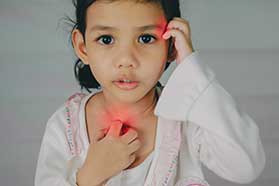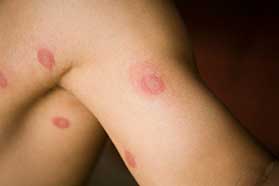Ringworm Treatment Newington, NH

Contrary to its troubling name, ringworm has nothing to do with worms—thankfully. Rather, ringworm is a common fungal skin infection known medically as tinea or dermatophytosis. Tinea is classified based on the part of the body that is affected:
- Tinea Capitis: Scalp ringworm most commonly afflicts younger children and affects both the scalp and hair follicles
- Tinea Corporis: Body ringworm primarily affects the legs and arms and can afflict infants, children and adults
- Tinea Cruris: Groin infection, commonly referred to as jock itch, that most commonly afflicts young men
- Tinea Pedis: Fungal infection impacting the foot, which is also commonly referred to as athlete’s foot, that most commonly afflicts those who have moist, sweaty feet due to poorly fitting shoes
Impacting both animals and humans, ringworm symptoms will vary depending on the body part afflicted. However, the infection typically begins with red, ring-like patches which can begin in a single area and then spread to other parts of the body. These patches tend to cause much discomfort and itchiness. As a contagious infection, it is important to seek treatment to prevent ringworm from spreading to others.
To schedule a consultation with a healthcare provider in Newington that can provide ringworm treatment, call (207) 536-9661 or contact Dr. Johanna Mauss online.
Cause of Ringworm & Risk Factors
Ringworm is caused by a type of fungus called a dermatophyte. Dermatophytes require keratin—a protein found in skin, hair and nails—in order to live. Dermatophytes are resilient, and are transmitted via contact with an infected host (animal or human) or via direct or indirect contact with infected exfoliated skin or hair.
The risk of developing ringworm is higher in youth (under the age of 16) and tends to spread amongst family members or athletes due to close contact. The likelihood of developing ringworm also increases if:
- You take medications or receive medical therapy which weaken the immune system
- You come into contact with dermatophytes while wet or are in an area with moist conditions like in a public shower or pool
- You come into contact with dermatophytes and have minor skin abrasions
- You share items such as hairbrushes, clothing or towels with infected individuals
What Does Ringworm Look Like?

Ringworm often develops as a rounded, red patch of skin with the center of the patch typically lighter than the outside. This is how tinea gets it colloquial name of ringworm. These patches may become itchy, scaly or raised and even develop blisters without treatment. Patches are typically isolated to one area when the infection begins but can spread to other areas of the body. On the scalp, ringworm may contribute to patches of hair loss as the hair near the patches become brittle and break easily.
Treatment for Ringworm
Your healthcare provider is typically able to diagnose tinea based on a physical examination and a discussion of your symptoms. He or she will rule out other common skin conditions like psoriasis or impetigo. In most cases, dermatophytosis can be treated with a topical antifungal medication like clotrimazole or terbinafine. Depending on the severity or the area that is affected, your healthcare provider may forgo topical treatment and prescribe an oral antifungal medication; this is most often the treatment course for cases of ringworm of the scalp (tinea capitis).
During treatment, it is also important to prevent the fungal infection from traveling to other parts of the body. It is important to remember to:
- Gently wash and dry affected areas daily
- Wash bedding, towels and clothing daily while the infection is active
- Avoid tight fitting clothing or wearing materials which agitate the skin
If a family member, classmate, fellow athlete or pet has ringworm, it is important to maintain good hygiene in their presence such as washing your hands regularly—particularly with antifungal soaps—and to not share anything with the infected person or animal that may contain dermatophytes like combs, hairbrushes, towels or shoes.
If you or a loved one are infected with tinea, do not delay treatment. To schedule a consultation with a healthcare provider in Newington that can provide treatment for ringworm, call (207) 536-9661 or contact Dr. Johanna Mauss online.
Vibrant Health Natropathic Medical Center
Address
501 Islington StSuite 2B
Portsmouth, NH 03801
(207) 536-9661
vibranthealthnaturalmedicine.com/
Hours
Mon:
9:00 am - 5:00 pm
Tue:
9:00 am - 5:00 pm
Wed:
10:30 am - 5:00 pm
Thu:
9:00 am - 5:00 pm
Fri:
10:00 am - 4:00 pm
Sat:
Closed
Sun:
Closed


